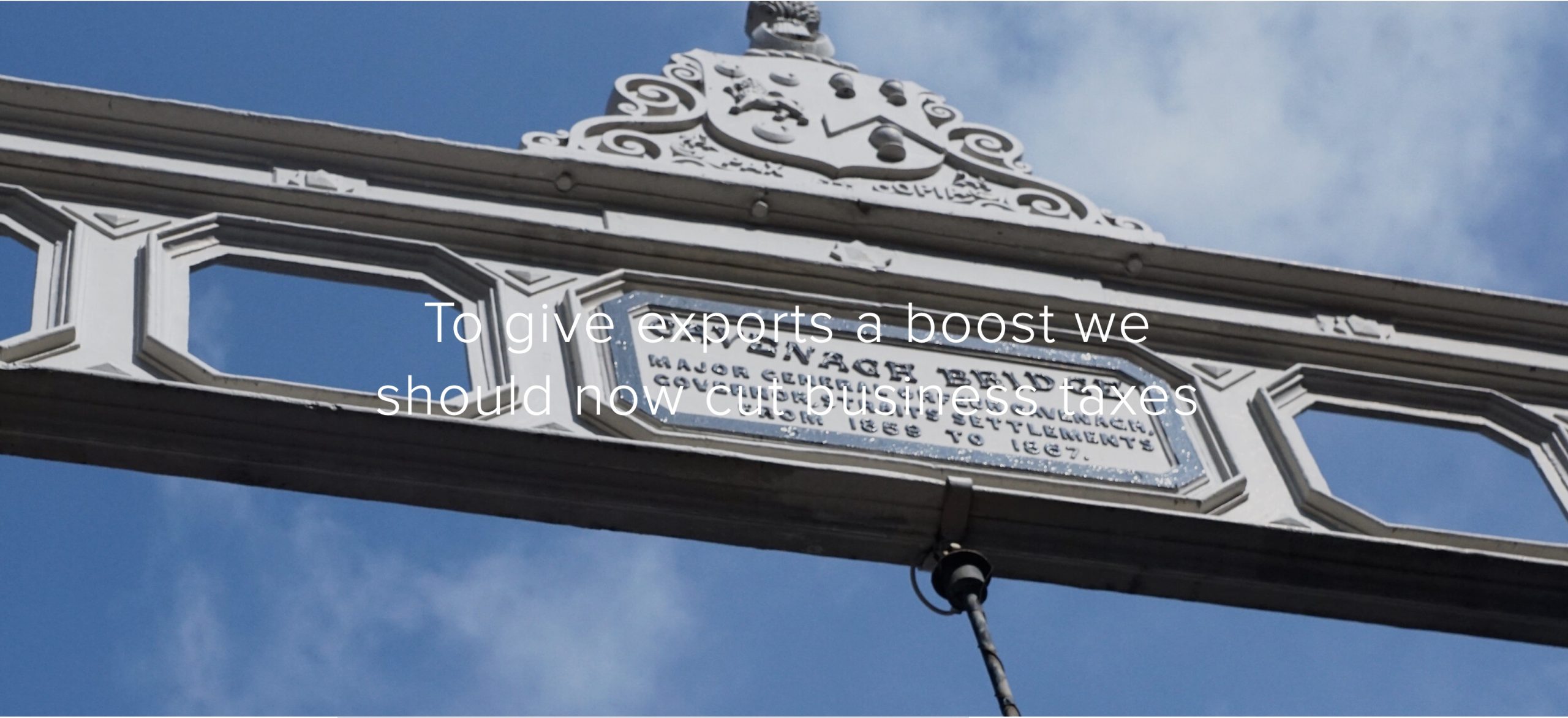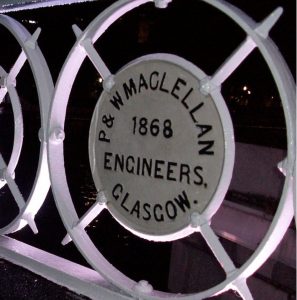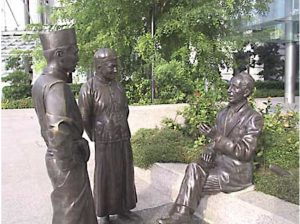By Eben Wilson
A RECENT VISIT to South East Asia prompts in me a policy challenge. Now the UK is freed from the burdens of the EU’s protectionist trade stance how do we use globalism to create the wealth we need to add value across the UK? The picture immediately below is from Singapore.
You will note the origins of this ironwork. Designed and built anew in Glasgow in 1865, the Cavenagh Bridge was dismantled, delivered on a Scottish steam ship and re-built on its site near the mouth of the Singapore River. Intriguingly, within only a hundred yards or so there was a jetty running directly into the sea at Singapore Bay, the landing place for traders nearest to the river and its settlement. That jetty was owned by Alexander Laurie Johnston, originally from Kirkcudbright Dumfriesshire, who set up shop there in 1830. His prime position; and being an early trader in what was essentially a fishing village made him wealthy and helped build Singapore’s future.
Global Brits in those days were prone to arriving out of the blue, setting up shop, and generating capital value from their presence. They didn’t have a Boeing to bring them back home. What lesson is there here then for today’s enterprising Brits?
Well, there is a rule-of-thumb in marketing that “any local sale takes three visits, but an overseas one takes five”. No doubt Alex Johnston reached his five visits by being there and talking to local merchants. There is in fact a statue of him near the Cavenagh Bridge doing exactly that, talking to both Chinese and Malay traders.
Being present abroad is vital for any British business hoping to trade with Asia; we have to devote time to build relationships. We have to learn cultural expectations, understand and manage local interpretations of our motives among those we meet; often using an interpreter, which is a hellishly slow way of building trust and understanding – but you don’t get contracts without that trust.
This is where the UK’s domestic policy lessons lie. This trust building effort takes cash, and a lot of it. The world of today’s international trade is of course different from 1850; largely, we trade not in commodities but in serviced products, technical services, and specialist knowledge support. But we still need the chutzpah and dedication to build relationships and that means committing to time and cash outlays.
Today, there are ameliorations to the five visit rule. The internet changes a lot, you can share initial information across the globe, and to some extent “share” visits electronically. I also detect another trend, especially in services; the first trade does not need to be massively ambitious, new partners can test out your capabilities by offering small commissions, letting you build a further relationship through mutual respect due to past success, although that can demand yet more visits through time. For modern British businesses, where the majority of companies are relatively small but flexible, the opportunity is there to succeed by innovating beyond the standard, and expensive, offers of the global corporates.
But, I repeat, it all takes cash; so we need policies that help with cash flow. And here, we have a problem; a policy stance that tears cash out of our traders and instead a) prefers to punish profit through Corporation Tax b) taxes the skilled payroll through NIC and income tax, and c) top slices margins through VAT.
For businesses VAT is a cash plughole swallowing 20 per cent of margins, corporation tax a mallet that hammers 20 per cent of the success that can be used to breed more success.
And don’t underestimate how hard this work is. An acquaintance of mine has just come back from another five day trip to North America – flying to a different city every day, travelling in the evenings and early mornings; selling through the day – for the third time in the past year.
I doubt there is a government employee who would accept this sort of punishment; there would be no incentive in it for them, their eco-system relies on arrangements where other people’s money is used to fund a politicised focus on “their” public services. In fact, despite my acquaintance being one of those who create the wealth to pay for green policies, they would no doubt castigate him for damaging the environment.
This is a very long way from Alex Lawrie Johnston sitting on a dockside drumming up new trades from nothing. Yet it’s that wealth creation that must be central to all our policy choices. It’s the nothing to something effort that benefits all Brits. No-one knows whether Alex Johnston was instrumental in the ordering up of his local bridge from Glasgow, but he and it were instrumental in what happened next. The Cavenagh Bridge became so heavily used that it eventually had to be closed to cattle and heavy goods traffic. By then, the Singaporeans had the wealth to buy and build many new bridges. Britain and Scotland benefitted from them too, and still does; most of Singapore’s buses were built in Falkirk.
Singapore’s expanding entrepot saw billions of trades and millions of traders make their wealth there. The key to success was largely the freedom to use cash to build capital and the absence of interference from government; while the outcome was a first world city where wages are higher than in the UK.
I am, of course, well aware that Singapore has some very strict social rules that control its inhabitants, but these are much more recent than its historic growth and economic success. They are arguably less intrusive than the UK’s socially destructive dependency generating interferences into the lives of our less well-off; the clientele of our leftist state. They are certainly less damaging than the widely held myth that because the rich are rich, they create the poverty of the poor. In Singapore, anyone can make good through their own efforts, and are lauded for their success. Snorting at “a Singaporean state” or “Singapore-on-Thames” as a post-Brexit dream is not only a nonsense, it denies recognition of the achievements of many thousands of enterprising Asian individuals and quite a few Brits too.
The cash absorbing overhead of the taxing British state (and not forgetting the Scottish government’s carping grievance over a lack of growth and success which is largely of its own making through interference) is the biggest hurdle to the UK building real wealth across the world. We did it a hundred and fifty years ago; we need the cash freedom to repeat that journey. Cutting business taxation is where to start.
Eben Wilson is an Honours Graduate in Economics from St Andrews University. He has had three careers, initially in journalism and broadcasting (including Milton Friedman’s TV series “Free to Choose”), economics (as an associate Scholar of the ASI) and now business (founding various companies).



